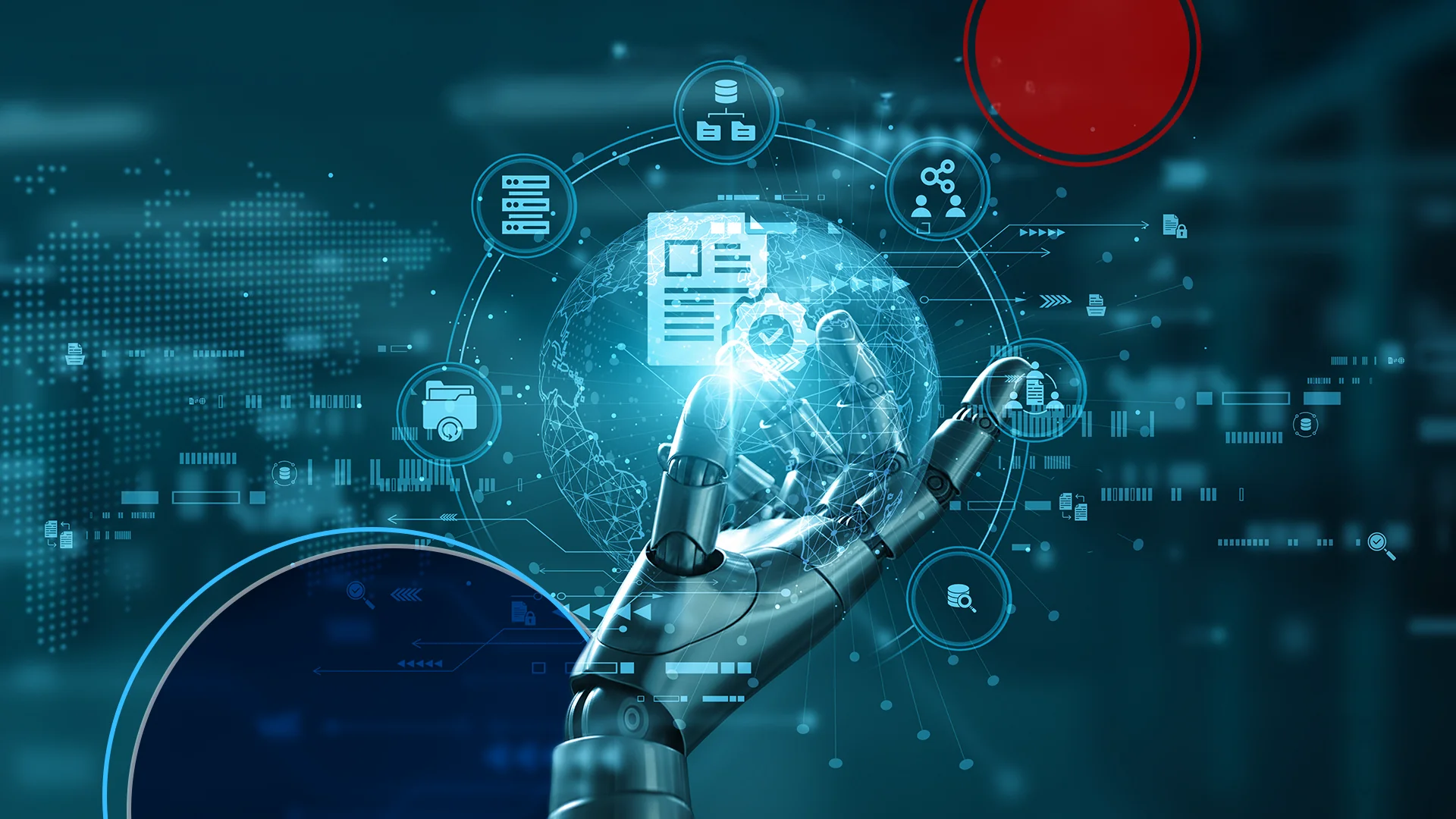By Divyanka Salona, REI Systems’ Principal Business Analyst
A New Era for Developers
The world of software development has undergone a seismic shift over the past few years. What once seemed like futuristic technology — AI that can write code — is now embedded in the everyday workflow of developers. This transformation has accelerated repetitive tasks, enhanced the accuracy of code, and freed developers to focus on higher level work. But this shift is not without its challenges. In mission critical, regulated environments like the ones REI Systems operates in, the integration of AI tools must be approached with careful consideration for governance, compliance, and security.
This blog will explore how AI is changing the way developers write code, with a particular focus on how REI Systems has embraced these tools in its own development processes. We’ll discuss the evolution of AI in coding, the current state of these tools, and the future of AI in software development. Furthermore, we’ll delve into the importance of adopting AI tools responsibly — especially within environments that require strict compliance, such as federal systems.
The Evolution of AI in Software Development: Past, Present, and Future
AI has not always been a central part of the software development process. In the early days, tools that assisted developers were relatively simple: auto-completion in IDEs, basic refactoring tools, and debugging assistance. These tools were helpful, but they still required developers to do most of the heavy lifting.
However, over the past few years, we’ve seen a rapid evolution. In the early 2020s, large-scale machine learning models like OpenAI’s GPT and coding assistants like Github Copilot began to demonstrate the real potential of AI in software development. These tools could not only suggest code completions but also write entire functions, generate tests, and refactor code.
By 2025, the adoption of AI tools had reached critical mass. According to a recent report by Google’s DORA team, 90% of survey respondents use AI as part of their work and more than 80% believe it has increased their productivity (Announcing the 2025 DORA Report | Google Cloud Blog). Research from Stack Overflow shows that developers are increasingly using AI not just for writing code, but for automating repetitive tasks, generating documentation, and even reviewing code. AI is becoming an indispensable part of the modern developer’s toolkit.
The future of AI in coding looks even more transformative. We’re on the cusp of seeing AI systems that can autonomously write entire applications, manage large codebases, and even collaborate with human developers in real-time. In regulated sectors like the public sector, the next few years will likely see AI tools that are tailored to specific industries, such as government software, healthcare systems, or defense applications. These tools will not only generate code but will do so in a way that understands the specific legal, regulatory, and compliance requirements of those domains.
At REI Systems, we are preparing for this shift. By adopting these tools early on, we are ensuring that we are ready for the next stage of AI integration, which will involve a seamless partnership between developers and AI systems that goes far beyond simple code generation.
How REI Systems is Embracing AI Tools in Development
At REI Systems, we are always looking for ways to accelerate the delivery of software that meets the highest standards of compliance, security, and mission relevance. Over the past year, we’ve rolled out AI-powered coding assistants to help our development teams increase efficiency and improve the quality of our software.
Case Study: Accelerating Legacy System Modernization
In one of our recent projects to modernize a complex, legacy award management system for a federal client, we leveraged AI coding tools to accelerate the process. The project required substantial code refactoring, testing, and documentation, all time-consuming tasks that typically slow down development timelines. By integrating AI-powered tools like GitHub Copilot into the workflow, we were able to generate context-relevant custom code, automate test case generation, and refactor legacy code with minimal developer intervention.
This integration resulted in higher speed measured as 5–7 extra story points per sprint/team, 30–50% less boilerplate code, 40–60% faster unit tests, and 60–80% less documentation effort. These improvements saved us weeks of development time, enabling our engineers to focus on more complex tasks like improving system architecture and ensuring that the software met all necessary compliance and security standards. We also used these tools to improve accuracy, catching potential errors and bugs earlier in the development process, which further enhanced the quality of the final product. Today, over 50% of our engineering team on the program is actively using GitHub Copilot for code generation and refactoring. These tools are particularly useful for speeding up the development of new features and reducing the backlog of maintenance tasks that often plague large, complex systems.
For another federal health client, we adopted Windsurf, an agentic-AI enabled, FedRAMP certified IDE to support modernization efforts. Windsurf was integrated into the coding, testing, and documentation phases to help automate routine tasks, reduce manual effort, and ensure consistency across the software development lifecycle. This integration resulted in 10–20% productivity gains for several projects, directly translating to lower costs of development for our customer.
The Importance of Governance and Compliance in AI-Driven Software Development
While AI coding tools offer significant advantages in terms of speed and accuracy, they also raise important questions about governance and compliance. At REI Systems, where we work with highly sensitive government systems, we can’t afford to take shortcuts when it comes to security, data privacy, and regulatory compliance.
For example, when choosing AI tools for code generation, we carefully assess whether they comply with Federal Risk and Authorization Management Program (FedRAMP) standards. This is essential for ensuring that the tools we use meet federal security and privacy requirements, particularly when dealing with government data. Many of the most popular AI coding tools, such as GitHub Copilot, meet a more general commercial standard, such as SOC 2 compliance, and are suitable for work in such environments. For systems that are highly sensitive and need to meet more rigorous standards (e.g. FedRAMP), REI Systems has worked to integrate AI tools like Windsurf which are specifically tailored to meet these higher security and compliance standards. Alternatively, where some agencies have launched their respective enterprise-wide LLM chatbots with endpoint serving capabilities, REI is leveraging them to create an agency-specific toolkit for accelerated software development, thus staying focused on delivering measurable improvements in productivity while adhering to federal regulations.
Additionally, robust frameworks must be established around the use of AI tools. At REI, we ensure that all AI-generated code goes through the same rigorous review process as manually written code. This includes code quality checks, security vulnerability scanning, and ensuring that the code complies with applicable regulations and standards. We also track the provenance of AI-generated code, maintaining detailed audit logs that document every change made to the system. This is particularly important in environments where transparency and accountability are paramount.
What’s Working and What’s Not: Insights from REI and the Broader Industry
AI-powered coding tools have undoubtedly made life easier for developers, but they are not a panacea. While many developers report significant productivity gains, others are cautious, especially when it comes to trust and accuracy. As Stack Overflow notes in its 2025 survey, developers are still wary of AI-generated code, especially when it comes to critical applications where security and accuracy are paramount or is high in complexity.
What’s Working
For many development teams, the shift to AI tools has been a major success. For instance, GitHub’s 2025 survey of developers showed that nearly 80% of respondents reported productivity gains when using AI to assist with routine coding tasks like test generation and bug fixing. Similarly, at REI, our development teams have seen a noticeable reduction in time spent on repetitive tasks, allowing them to focus more on higher-order problem solving and mission-critical software improvements.
What’s Not Working
Trust remains an issue, but it’s not the only challenge developers face when adopting AI tools. According to the 2025 DORA report, while 90% of developers report using AI tools in their work, 30% say they trust AI‑generated code “a little” or “not at all.” This lack of trust is particularly evident in more complex or mission-critical tasks, where developers remain cautious about AI’s ability to generate accurate and reliable code.
Beyond trust, context understanding and integration are key hurdles. The 2025 DORA report highlights that AI tools perform significantly better when development teams use well‑organized and indexed code repositories, enabling the AI to understand their codebase’s context and provide more accurate suggestions.
At REI, we are actively assessing how repository‑indexing tools and structured workflows can support more effective AI‑tool integration, ensuring that our development teams leverage AI to augment human expertise rather than replace it.
The key takeaway here is that AI should be seen as a tool that augments human expertise rather than replacing it. At REI, we view AI as a valuable assistant — one that helps our developers write code faster and more accurately but still requires human oversight to ensure it aligns with our mission and compliance requirements.
The Bottom Line: Key Takeaways for Organizations Using AI in Development
- Adopt AI Tools Thoughtfully: AI coding tools can be transformative, but they must be integrated thoughtfully into existing development workflows. Ensure that tools are properly vetted for security, compliance, and suitability for the task at hand.
At REI, we carefully evaluate every AI tool for security and compliance standards, ensuring that they align with our rigorous requirements, such as FedRAMP and SOC 2 compliance. This ensures the tools we use are safe, effective, and meet the specific needs of each project.
- Governance is Key: Establish strong governance frameworks to ensure that AI-generated code is reviewed, tested, and compliant with regulations.
At REI, we treat AI-generated code the same as any other code — it must go through rigorous quality assurance and security checks. We have implemented comprehensive governance frameworks for AI tools, which includes strict review processes, quality assurance checks, and compliance testing. Every piece of AI-generated code is validated by our team to meet federal security, regulatory, and operational standards.
- Focus on Developer Empowerment: AI tools should not replace developers but empower them to focus on high-value tasks, like design and architecture. Developers are increasingly becoming “code orchestrators,” guiding AI to deliver the right solutions.
At REI, we focus on empowering our developers by integrating AI tools that automate routine tasks such as code generation and testing, allowing our engineers to focus on higher-level problem-solving, system design, and innovation. This shift helps us deliver more efficient and impactful solutions to our clients.
- Trust and Transparency Matter: As the industry continues to mature, trust in AI-generated code will improve, but it will take time. Build transparency into the process, track the provenance of AI-generated code, and ensure human oversight at every stage of development.
At REI, we ensure full transparency and traceability of AI-generated code by maintaining detailed audit logs. Our developers oversee every step of the process to ensure accuracy and compliance, fostering trust and accountability throughout the development lifecycle.
- Prepare for the Future: As AI continues to evolve, the future of coding will involve even more sophisticated AI tools capable of handling large-scale software projects, understanding complex regulatory requirements, and collaborating with developers in real-time.
At REI, we are proactively preparing for the future by continually evaluating and adopting cutting-edge AI tools that enhance our development capabilities. We are positioning ourselves to be at the forefront of AI innovation, ensuring that our development processes remain scalable, secure, and compliant with evolving regulations.
Conclusion
The rise of AI-powered coding tools marks the beginning of a new era in software development. At REI Systems, we are embracing this technology, but we are also mindful of the unique challenges that come with working in mission-driven, regulated environments. By adopting AI tools responsibly, ensuring compliance, and maintaining rigorous governance, we are positioning ourselves to deliver faster, more reliable software while maintaining the highest standards of quality and security.
As we look to the future, AI will continue to evolve, and so will the role of developers. By working alongside AI, developers will be able to focus more on higher-level problem-solving, enabling them to deliver even greater value to the organizations they serve.




